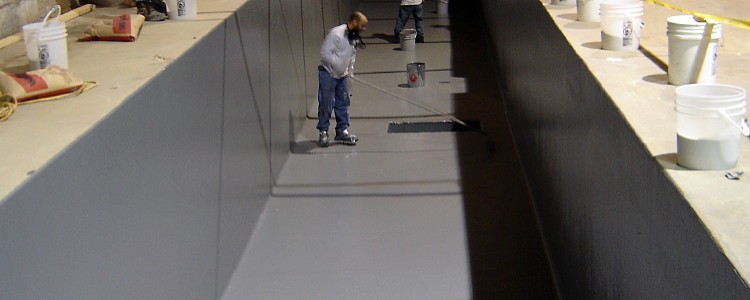Vinyl Ester

Vinyl ester coatings provide the ultimate in chemical and solvent-resistance. These coatings are resistant to a broad range of chemicals, including acids and alkalis. So, they are ideal for corrosion-control and containment applications. Vinyl ester can be used for concrete and steel tank linings, or as a concrete floor topping.
Vinyl ester resins are a cross between polyester resins and epoxy resins. These coatings typically exceed both polyester and epoxy in corrosion resistance, temperature resistance, and elongation (toughness). Because of this, vinyl esters are generally used when high durability, thermal stability, and extremely high corrosion resistance are a performance requirement.
We will work closely with our contractor partners to install flooring solutions that meet your requirements throughout your facility.
PIP VE-CR Resin
Vinyl Ester Primer/Saturant/Broadcast System
PIP VE-CR RESIN is a catalyzed, novalac vinyl ester resin for heavy duty protection of concrete and steel substrates. It is a highly chemical resistant resin that provides excellent resistance to diluted acids, moderate alkalis, and a broad range of chemicals.
PIP VE-SR Resin
Solvent-Resistant Vinyl Ester Resin
PIP VE-SR Resin is a catalyzed, novalac vinyl ester resin for heavy duty protection of concrete and steel substrates. It is a highly chemical resistant resin that provides excellent resistance to concentrated acids, strong solvents, mild alkalis and a broad range of chemicals.
PIP VE-PR Flex
Flexibilized Vinyl Ester Primer
PIP VE-PR Flex is a flexiblized vinyl ester elastomer-modified primer resin designed to offer superior resistance to abrasion and mechanical stress. This resin offers increased adhesive strength while providing greater toughness and elongation.
PIP VE-FR Resin
Fire-Resistant Vinyl Ester System
PIP VE-FR Resin is a fire-retardant, brominated, bisphenol-A epoxy vinyl ester resin. This product provides corrosion-control to a wide variety acids and alkalis. It can be used to produce glass-reinforced laminates with excellent impact and stress resistance. PIP VE-FR Resin is ideal for environments that require resistance to flame spread, thermal cycling and corrosion.
PIP VE-CR 40 Flake
Vinyl Ester Flake Lining/Coating
PIP VE-CR 40 Flake is a 40 mil catalyzed, vinyl ester resin for medium duty protection of steel or concrete substrates. It is a highly chemical resistant resin that provides excellent resistance to alkalis, acids and a broad range of chemicals. It is used for steel or concrete tank linings in immersion service and as a floor topping.
PIP VE-SR 40 Flake
Novalac Vinyl Ester Flake Lining/Coating
PIP VE-SR 40 Flake is a 40 mil catalyzed, Novalac Vinyl Ester resin for medium duty protection of steel or concrete substrates. It is a highly chemical resistant resin that provides excellent resistance to alkalis, acids, solvents and a broad range of chemicals. It is used for steel or concrete tank linings in immersion service and as a floor topping.
PIP VE-CR 70 Flake
Vinyl Ester Flake Glass Lining
PIP VE-CR 70 Flake is a catalyzed, vinyl ester resin for heavy duty protection of steel substrates. It is a highly chemical resistant resin that provides excellent resistance to alkalis, acids and a broad range of chemicals. It is used for steel tank linings in immersion service.
PIP VE-SR 70 Flake
Vinyl Ester Flake Lining
PIP VE-SR 70 Flake is a catalyzed, novalac vinyl ester resin for heavy duty protection of steel substrates. It is a highly chemical resistant resin that provides excellent resistance to alkalis, inorganic/organic acids, solvents and a broad range of chemicals. It is used for steel tank linings in immersion service.
PIP VE-SR Graphite Filled
Graphite Filled Vinyl Ester Coating and Lining
PIP VE-SR Graphite Filled is a graphite filled, novalac vinyl ester coating and lining for heavy duty protection of concrete and steel substrates. It is a highly chemical resistant coating that provides excellent resistance to concentrated acids including hydrofluoric acid, strong solvents, mild alkalis and a broad range of chemicals.
PIP VE-GP/VE-Conductive
Conductive Vinyl Ester System
PIP VE-Conductive coating is a 10-15 mils thick epoxy novalac vinyl ester resin top coat system designed to facilitate electrostatic control while exhibiting excellent resistance to both aliphatic and aromatic organic and inorganic acids.
PIP VE-GP is a vinyl ester conductive ground plane primer designed to be used in conjunction with PIP VE-Conductive top coat to achieve electrostatic control properties.
PIP VE-Curing Aid
Vinyl Ester Curing Aid
PIP VE-Curing Aid is an additive that is designed for use in all PIP VE vinyl Ester coatings. It prevents surface air inhibition at the surface and enhances the hardness and complete cure of the finish or final coat. The use of this additive eliminates the surface tackiness sometimes associated with vinyl ester coatings.
DO NOT USE PIP VE-CURING AID IN PRIMERS, BASECOATS OR MUD COATS. ONLY USE THIS ADDITIVE IN THE FINAL COAT. THE USAGE OF THIS MATERIAL ON ANYTHING BUT THE TOPCOAT WILL RESULT IN BOND FAILURE.

